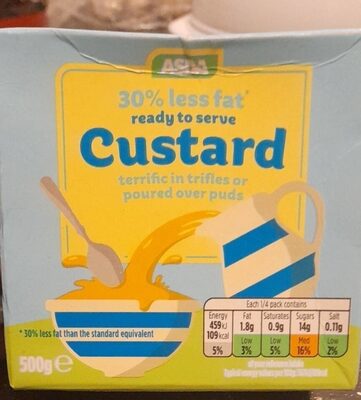
Barcode: 21115882
ready to serve custard
HALAL
📝 Reason: The product is primarily composed of Halal ingredients, with the exception of unspecified flavorings which render it Doubtful. According to Islamic dietary laws, products containing Doubtful ingredients should be avoided unless their Halal status can be confirmed. The absence of Haram ingredients or E-codes ensures the product is not outright Haram.
🏷️ Category: N, /, A
📄 Certificates: Vegetarian, No Artificial Colors, Vegetarisch
Ingredients:
Details
Understanding the Halal Status of Ready to Serve Custard
The Ready to Serve Custard is a popular dessert option, but for those following Halal dietary laws, it’s crucial to understand its ingredients. According to Islamic dietary principles, certain food products should be scrutinized for their compliance with Halal standards. This article investigates the Halal status of the Ready to Serve Custard by breaking down its components and addressing their sources.
Ingredients Breakdown
Here are the primary ingredients found in the Ready to Serve Custard:
- Reconstituted skimmed milk – Derived from milk, which is considered Halal as per Islamic dietary laws.
- Reconstituted buttermilk – Also derived from milk, hence compliant with Halal requirements.
- Water – Universally recognized as Halal.
- Sugar – Plant-derived and considered Halal.
- Modified maize starch – Derived from maize, classified as Halal unless tainted with Haram substances.
- Vegetable oils (palm, coconut) – Both oils are plant-derived and Halal.
- Milk protein – Derived from Halal sources (milk).
- Flavouring – The source is unspecified; therefore, it is categorized as Doubtful.
- Colours (carotenes, paprika extract) – Plant-derived and Halal.
Halal Assessment of Each Ingredient
Reviewing these ingredients collectively shows that most are Halal certified. Specifically, the following points arise:
- Milk and Milk Products: Both skimmed milk and buttermilk are derivates of milk from Halal animals, thus ensuring their compliance with Halal standards.
- Water and Sugar: These are natural ingredients derived from plant sources. They pose no conflicts with Halal guidelines.
- Modified Maize Starch: This ingredient is derived from maize, which is generally considered Halal unless exposed to non-Halal elements during processing.
- Vegetable Oils: The use of palm and coconut oil reaffirms the product’s compliance, as they stem from Halal sources.
- Flavouring: This ingredient presents a challenge. The unspecified nature of the flavouring makes it ‘Doubtful’ under Halal classifications. Consumers are advised to seek further information from the manufacturer regarding this particular ingredient.
- Food Colors: The colors used (carotenes and paprika extract) are derived from natural plant sources and are therefore Halal.
Conclusion: Is Ready to Serve Custard Halal?
In summary, the overall Halal status of the Ready to Serve Custard is predominantly positive, with most ingredients confirming to Halal standards. However, the presence of the unspecified flavouring creates uncertainty, causing it to have a ‘Doubtful’ classification. For Halal consumers, it’s advisable to exercise caution and potentially look for Halal-certification labeling or to inquire for detailed ingredient sourcing regarding the flavourings used in the product.
Brands that respect Halal dietary requirements often pursue additional certifications. Though this particular product carries vegetarian labeling and has no artificial colors, confirmation from the manufacturer about the halal status of the flavoring would enable consumers to make well-informed decisions.
Ultimately, while the Ready to Serve Custard is enjoyed by many, its Halal status may vary based on personal dietary laws and the assurance provided by the manufacturer.
